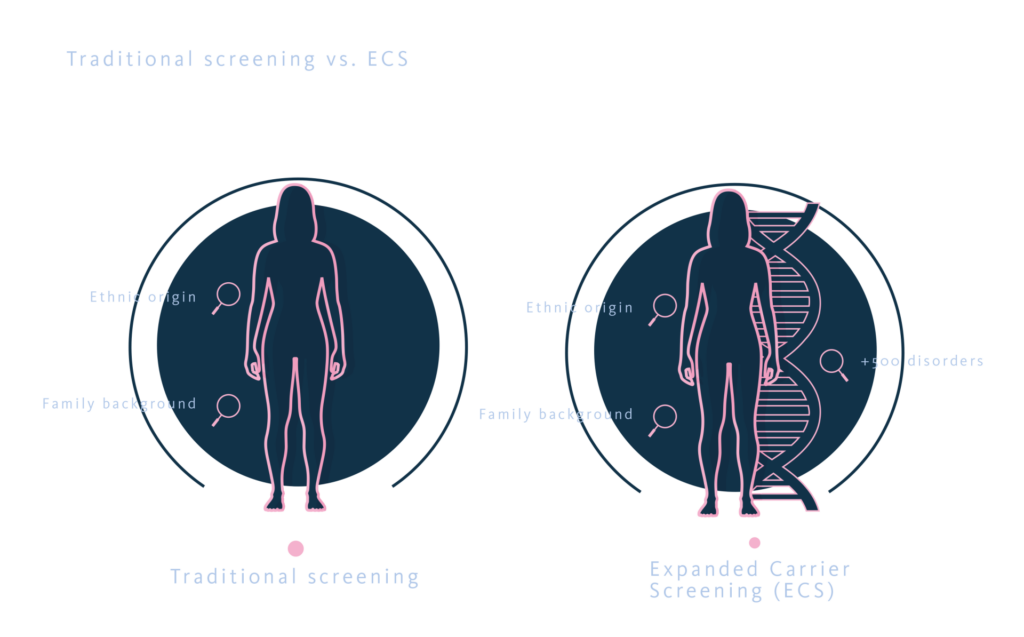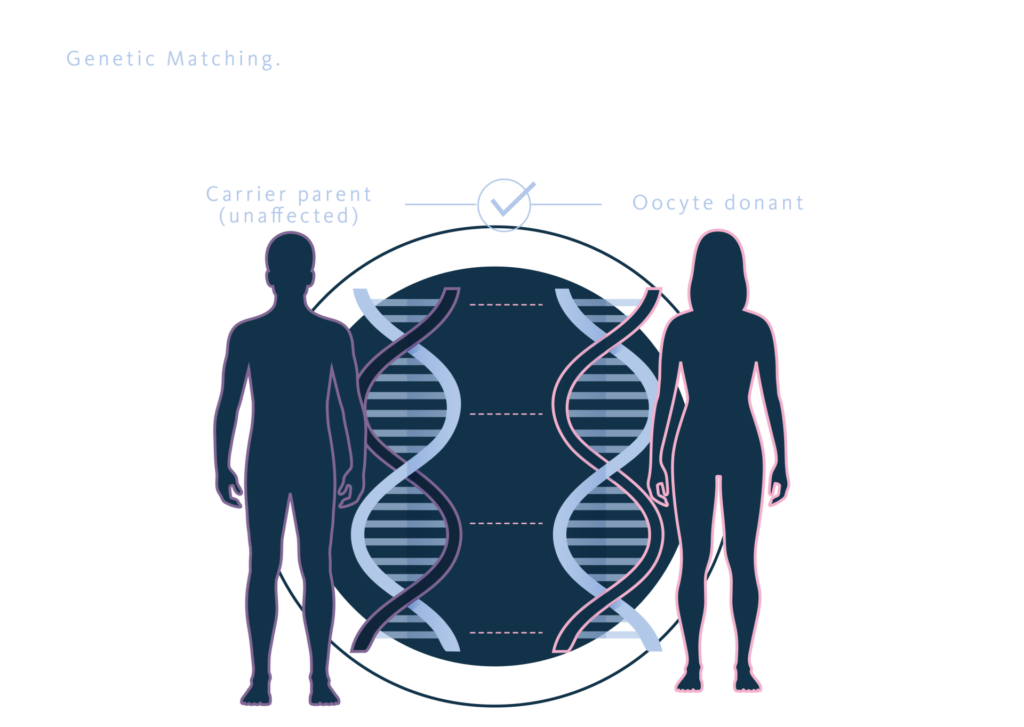In an era where personalized medicine is revolutionizing every aspect of healthcare, reproductive technologies are no exception. Among these, Expanded Carrier Screening (ECS) is emerging as a transformative tool in the realm of egg donation and fertility treatments. ECS enables comprehensive genetic testing of gamete donors for hundreds of recessive and X-linked conditions, marking a shift from traditional screening models based solely on ethnicity or family history.
What Is Expanded Carrier Screening (ECS)?
ECS is a genomic testing method that evaluates a donor’s carrier status across a wide panel of genetic conditions, sometimes up to 500 disorders in a single assay. Unlike traditional carrier screening that relies on family history or ethnicity-based risk profiles, ECS applies a universal approach. It allows identification of silent carriers who may unknowingly harbor pathogenic variants that could affect offspring if matched with another carrier of the same condition.

Why ECS Matters in Egg Donation
A number of high-profile cases in recent years have demonstrated that relying on family history alone can result in donor-conceived children inheriting serious genetic conditions (Hudson et al., 2025). ECS introduces a higher level of security and risk mitigation, aligning with the growing demand from recipients for reassurance about donor health and safety.
A 2025 study by Araújo et al. highlights the tangible clinical impact of ECS in donor selection. In a cohort of 581 oocyte donor candidates, 81 were excluded based on findings from karyotyping and carrier screening for conditions such as Cystic Fibrosis, Fragile X Syndrome, and Spinal Muscular Atrophy. These results illustrate how ECS is crucial in protecting recipient families from inherited conditions and reinforce calls from fertility societies to integrate more comprehensive genetic testing into donor programs—even as debates continue over mandatory implementation.
Additional support for the clinical value of ECS comes from recent real-world case data. A 2023 case report by Veneruso et al. demonstrated how ECS—using both array comparative genomic hybridization (aCGH) and whole-exome sequencing (WES)—successfully identified pathogenic variants in a couple undergoing fertility assessment due to autism spectrum disorder (ASD) in the family history. Notably, a likely pathogenic variant in the LPL gene, which may be linked to neurodevelopmental disorders, was identified in the male partner.
This highlights ECS’s growing potential not only in preventing Mendelian disorders but also in evaluating complex traits when both partners are tested preconceptionally.
Last but not least, a 2023 review by Drettas et al. highlighted ECS as a game-changer in ART, proposing a reform in the medical definition of “serious/severe” genetic disease. Their analysis emphasizes how ECS, in conjunction with preimplantation genetic testing (PGT), can reduce elective pregnancy terminations and improve clinical outcomes by identifying conditions treatable in pregnancy or at birth. They argue for ECS’s moral and medical necessity in assisted reproduction, especially when minimizing harm to both offspring and parents aligns with bioethical principles such as beneficence, autonomy, and justice. ECS also supports more responsible donor selection, helping recipients avoid transmission of complex and rare disorders such as MODY (maturity-onset diabetes of the young), often missed in traditional screening models.
GAMETIA’s Genetic Matching Solution
GAMETIA Biobank offers a personalized genetic matching service designed to maximize reproductive safety. This service compares the ECS results of donors with the genetic profile of the male partner in the recipient couple. The analysis evaluates 2,128 genes associated with recessive monogenic disorders using advanced Next Generation Sequencing (NGS) technology. Special attention is given to variants prevalent in Mediterranean populations.
This targeted matching ensures that donors who share mutations with the male partner are excluded, minimizing the risk of transmitting inherited diseases. GAMETIA prioritizes ideal matching where both gamete providers have undergone the same ECS panel. If a recipient’s clinic has used a different test, GAMETIA adapts by selecting donors who are non-carriers of the specific genes flagged in the recipient’s report.
This approach ensures a highly tailored and ethically responsible solution, aligning with both clinical effectiveness and the emotional security that patients seek.

Ethical and Emotional Dimensions
While ECS increases the safety and confidence in donor selection, it also raises ethical questions:
· Information Overload: How do patients process complex genetic data, especially in emotionally charged situations?
· Donor Autonomy: Donors may receive unexpected information about their own genetic risks, which could influence future family planning.
These considerations highlight the importance of genetic counseling as an integral part of ECS. Without it, recipients and donors may struggle to interpret results or make informed choices (Mertes et al., 2018).
ESHRE also cautions that commercial motivations should never drive donor screening policies. The risk is that clinics begin to implement ever-expanding genetic panels not based on clinical necessity, but on market competitiveness and legal liability protection. As ECS becomes more accessible and technologically advanced, fertility professionals must guard against “preventive perfectionism” that disregards proportionality and practicality. Moreover, the European Society of Human Reproduction and Embryology (ESHRE) emphasizes that while expanded screening may enhance reproductive safety, it also presents complex ethical challenges. Their Task Force on Ethics and Law (Dondorp et al., 2014) warns that broader testing should be guided by proportionality, respect for donor autonomy, and protection from unnecessary psychosocial harm. Importantly, they caution against using ECS as a commercial tool or subjecting donors to excessive genetic scrutiny without proven clinical utility.
A New Paradigm of Repro-Genetic Selection
As described by Hudson et al. (2025), ECS in Gamete Donation functions as a new form of selective reproductive technology—not merely aimed at achieving pregnancy, but at producing genetically “healthy” offspring. While ECS does not eliminate all risks, it does reduce the likelihood of passing on known recessive conditions, contributing to the broader shift toward pre-conception genetic optimization.
In fact, a survey by Jackson et al. (2017) found that 91% of gamete recipients preferred donors who had undergone ECS rather than traditional screening methods. Clinics are
increasingly offering ECS as an add-on service in IVF cycles, and in some countries, it’s becoming standard practice (Henneman et al., 2016).
Recommendations for Best Practice
· Standardize ECS protocols: Establish clear guidelines for which conditions to test and how to act on results.
· Ensure access to genetic counseling for both recipients and donors.
· Support donor autonomy with transparent information and consent procedures.
· Monitor long-term impacts on donors, recipients, and offspring.
· Avoid disproportionate testing: Follow ESHRE guidance on maintaining ethical and proportional screening.
· Leverage high-quality matching services, like those offered by GAMETIA, to personalize risk reduction without overstepping ethical boundaries.
Final Thoughts
ECS represents a powerful advancement in donor egg IVF, offering peace of mind and improved clinical outcomes. But it must be implemented with care—balancing scientific rigor, ethical sensitivity, and emotional support. For biobanks like GAMETIA, ECS isn’t just a tool—it’s an opportunity to lead with responsibility and redefine excellence in reproductive care.
References
- Hudson N, Herbrand C, Culley L. (2025). The emergence and use of expanded carrier screening in gamete donation: A new form of repro-genetic selection. Bioethics, 39(137).
- Henneman L et al. (2016). Responsible implementation of expanded carrier screening. Eur J Hum Genet.
- Jackson E et al. (2017). Recipients’ perspectives regarding expanded carrier screening. Fertility and Sterility.
- Mertes H, Lindheim S, Pennings G. (2018). Ethical quandaries around expanded carrier screening in third-party reproduction. Fertility and Sterility.
- Dondorp W et al. (2014). Genetic screening of gamete donors: ethical issues. Human Reproduction, ESHRE Task Force on Ethics and Law 21.
- The Insight Partners. (2024). Egg Donation Market – Global Industry Analysis and Forecast. https://www.theinsightpartners.com/reports/egg-donation-market
- Veneruso I et al. (2023). The Potential Usefulness of the Expanded Carrier Screening to Identify Hereditary Genetic Diseases: A Case Report from Real-World Data. Genes, 14(1651). https://doi.org/10.3390/genes14081651
- Drettas P et al. (2023). The influence of expanded carrier screening in assisted reproductive techniques: changed the ‘game’ – review. Annals of Medicine and Surgery, 85:1811–1815. https://doi.org/10.1097/MS9.0000000000000657
- Araújo S et al. (2025). Genetic study on candidates for oocyte donation. JBRA Assist Reprod. 29(1):61-66. https://doi.org/10.5935/1518-0557.20240087
